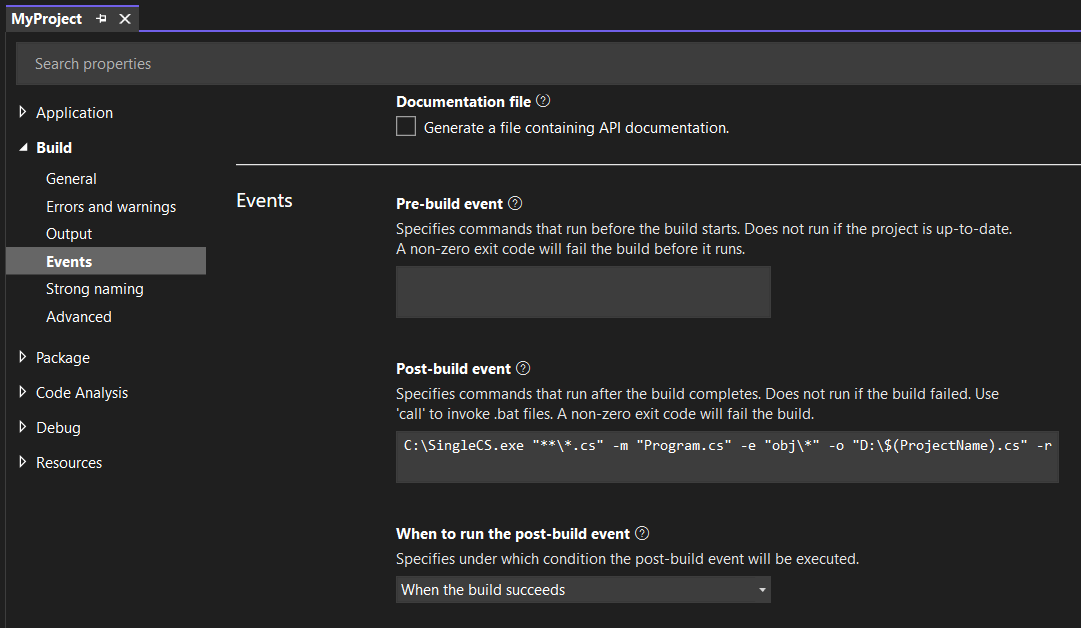This is a console application that combines .cs files into a single file.
Generally, it's not a good idea to write all your application in a single file. But in certain situations, you are required to store all of your source code in single file, e.g. online contests like Google's CodeJam ask to submit your answer as a single file.
Instead of writing your application in one file you could develop it as usual, separating each class or interface in their own file. Using SingleCS you can combine all .cs files together in build time.
Download the latest binary here.
It can be used as simple as running SingleCS.exe in CMD and specifying custom files paths as arguments:
SingleCS.exe "C:\MyProject\Program.cs" "D:\Helpers\Utils.cs"
The result is Program - Merged.cs file which is the combination of both Program.cs and Utils.cs and will be created in the directory that SingleCs is running.
Here is an example to show how SingleCS works. There is a project named MyProject in drive C: alongside SingleCS.exe. And there are multiple class files located in drive D: which we want to include in our output file.
- C:
- SingleCS.exe
- MyProject
- Models
- User.cs
- Product.cs
- Program.cs
- Models
- D:
- Helpers
- Utils.cs
- Math.cs
- Helpers
The contents of files are mostly omitted for the demonstration purposes:
Program.cs
using System;
using Helpers;
namespace MyProject
{
class Program
{
static void Main(string[] args)
{
// Main method...
}
}
}
Utils.cs
using System;
namespace Helpers
{
class Utils
{
// Utils class...
}
}
Other files are assumed to have simple class body without any using references:
Math.cs
namespace Helpers
{
public class Math
{
// Math class...
}
}
Both relative and absolute paths (and a combination of both) are supported by SingleCS. You can use wildcards (*, ** and ..) to specify patterns.
C:\>SingleCS.exe "MyProject\Program.cs" "MyProject\Models\*.cs" "D:\Helpers\Utils.cs"
These files would be grabbed by SingleCS. It outputs the name of the output file (that can be modified using --output flag), and a list of files that it grabs to create the output file:
SingleCS: Combining...
Program - Merged.cs
C:\MyProject\Program.cs
C:\MyProject\Models\Product.cs
C:\MyProject\Models\User.cs
D:\Helpers\Utils.cs
Here are the available flags:
| Short | Long | Description |
|---|---|---|
| -? -h | --help | Show help information |
| -e | --exclude | Exclude files |
| -m | --main | Add main files |
| -d | --directory | Specify working directory |
| -o | --output | Output files template |
| -r | --refactor | Refactor usings and empty lines |
You may want to exclude some files from a pattern (e.g. some .cs files created by compiler in obj folder), in this case you could use exclude flag (-e or --exclude) to specify files that should be excluded.
C:\>SingleCS.exe "MyProject\**\*.cs" --exclude "MyProject\obj\*"
\**\*.cs grabs all .cs files in all subdirectories.
By default, the first file that is grabbed by SingleCS would be assumed to be the "main" file, the file that its content will be stored on top of other files contents, in the resulted output file. But you can change this behavior by specifying main flag.
C:\>SingleCS.exe "MyProject\**\*.cs" --main "MyProject\Models\User.cs"
The result is User - Merged.cs file and User class content will be first on the list.
User - Merged.cs
using System;using System;
using Helpers;
namespace MyProject.Models
{
public class User
{
// User class...
}
}
namespace MyProject
{
...
If multiple arguments specified for main flag (or a pattern used), multiple output files will be created for each main file, each of which starts with on of the main file content on the top of the output file:
C:\>SingleCS.exe "MyProject\**\*.cs" --main "D:\Helpers\*.cs"
This command will create 2 output files:
Math - Merged.cs
D:\Helpers\Math.cs
C:\MyProject\Program.cs
C:\MyProject\Models\Product.cs
C:\MyProject\Models\User.cs
Utils - Merged.cs
D:\Helpers\Utils.cs
C:\MyProject\Program.cs
C:\MyProject\Models\Product.cs
C:\MyProject\Models\User.cs
This will change the working directory, which could simplify the relative paths specified in arguments.
SingleCS.exe "**\*.cs" --main "Models\User.cs" --directory "\MyProject"
Output files will be created for each main files (if no main files specified, the first file is the main one). By default, the name of the output file is the name of the main file appended with "Merged" word, like "<MainFileName> - Merged.cs". This could be changed by output flag. A string containing the pattern which we want our output files be created based on is specified, e.g. "*Output.cs". The asterisk (*) is the main file name. So if the main file is Program.csthe output file name will be ProgramOutput.cs.
C:\>SingleCS.exe "MyProject\**\*.cs" --output "*Output.cs"
Refactor removes duplicated using statements, empty lines and adds needed line breaks.
Without refactor flag the command below:
C:\>SingleCS.exe "MyProject\**\*.cs"
Will create this file:
using System;using System;
using Helpers;
namespace MyProject
{
...
Running it with refactor flag removes the extra using System;.
C:\>SingleCS.exe "MyProject\**\*.cs" --refactor
Resulting:
using System;
using Helpers;
namespace MyProject
{
...
Visual Studio has some build-in macros for build events. To make SingleCS to run after compilation of your project, in Visual Studio go to:
Project > Properties > Build > Events > Post-build event
And add your command there, for example:
C:\SingleCS.exe "**\*.cs" "D:\Helpers\*.cs" -m "Program.cs" -e "obj\*" -o "D:\$(ProjectName).cs" -r
This command does these things:
- Combines all .cs files inside project root and Helpers directory
- Makes sure that Program class is on top of the combined file
- Excludes files that are in obj directory
- Use build-in vs macro
$(ProjectName)as a template for output file's name pattern (the output name will beMyProject.cs) - Refactors using statements
- SingleCS does not check for syntax errors, so make sure that your files don't have any compilation errors. A good idea is to run SingleCS after building your project.
